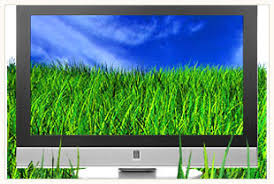Computers have become an integral part of our lives and have dominated many areas of our lives. In almost all areas of our lives, there is some sort of a computer or a miniaturized version of a computer making things easier for us. But does mother nature like us for using computers so much? With the introduction of "green computers", she definitely might as these computers that make use of renewable energy sources are immense energy savers and help to save our planet.

Here's the single biggest problem that has plagued all big computer businesses so far. Due to the fact that most computers have short life spans and do not go on to function for a long time, it has become increasingly common for us to dispose off our laptops into landfills where it can take as long as thousands of years to finally degrade into soil. From an environmentalist's point of view, this is not acceptable at all.
For a long time, many computer companies introduced "recyclable" computers to the market and tried to make it possible for consumers to dispose their electronic goods as recyclable materials that were also termed "green computing". And that started the whole "green computers" revolution.

The whole idea behind "green computers" is to make sure that factors like efficiency, recyclability and manufacturing from recycled products are ensured.
Processors – Big energy consuming monsters?
You may have experienced the vast amount of heat your computer generates when you use it for a long time. This is mainly from the processors which require a lot of energy to work efficiently. However, Steve Job's and the engineers at his company, Apple introduced revolutionary processors that consumed not only less energy but also generated less heat. This is what efficiency effectively means. If a processor generates insane amounts of heat, that is because it is very inefficient. Furthermore, there has been the calculation that for every 15-20 MB of data that you move on your hard disk, you actually use up upto a pound of coal. This is a lot of energy consumption and if true, is not at all good news for mother Nature. What this means is that you will be spending more money to maintain a computer than to buy a brand new one.

There has been a lot of innovation in the area of microchips that get used in microprocessors. For years, scientists have been trying to find a creative way to reduce the amount of heat that a processor generates. Yes, you can use coolers. But they once again use energy. It looks like companies like Apple, Sun MicroSystems and a certain Transmeta did a good job of trying to reduce this inefficiency in computers.
Along with processors and the CPU's, other important parts of a computer such as the monitor and power supplies use up a lot of power. Laptop's are slightly better off since they have limited battery power. This makes it possible for the user to put it in hibernation or sleep modes which makes it consumer significantly lesser power.
There have been other inventions such as quantum computing which makes it possible for significant reductions in power consumed by a computer. But they are confined to the doors of the laboratory and are not yet available commercially. Also, of course, is the possibility of using renewable sources of energy such as solar energy so that we do not pollute the environment by using coal. But having an efficient computer is a very good option as well.
Electronic waste is hazardous
The thing with "green computers" is that by using them, we can significantly reduce the amount of toxic and hazardous waste that is thrown out every year. Almost 75% of all hazardous materials is made of electronic substances. The elements used in manufacturing computers such as silicon andmercury and selenium and cadmium are all very harmful and do not decompose easily. Plus, there is the release of greenhouse gases that further causes harm. With the introduction of "green computers", these sort of harmful components will not be used and will be greener.
Changing the Obsoleteness of Tech Products and Computers
One of the biggest problems with buying that fancy, bright gadget about which "everyone is talking about" is that after 5 years or so, it will be considered ancient and obsolete. So that is when you would feel like throwing it away since it is no longer of any use to you. Future "green computers" will eliminate this problem. They will build computers that can successfully be upgraded in the future without having to throw it away to buy a new one.
Some companies such as Dell recover products annually for reusing them and recycling them.
For example, Dell recalled as much as 36 million kilos of dell computers last year in an effort to help save the environment. Companies which manufacture green computers will do more of this in the future. HP is also another company which made headlines by recycling old computers and cutting huge amount of costs last year.
Upgrade, do not buy new ones
One of the best ways to make sure that your computer lasts for a long time is to upgrade it
every year or so. Things such as more disk space and more RAM and better processors can all be bought individually and installed manually on the computer very easily and by yourself by following some guides on the internet. Also, one other thing that you may have noticed is that you do not always use up your CPU's full processing capacity if you are using basic applications such as computer games or AutoCAD etc. Green computers will make sure that such unwanted power will be reduced and be increased power whenever needed. Something like "overclocking" comes to mind when we talk about this. Also, there has been talk about the usage of technology such as "thin clients" and "dumb terminals" which are beyond the scope of this blog post.
So where exactly does the green computer stand?
The above is but a vague prediction of how a green computer in the future may look like. There have been plenty of research and advancement done in this field and it could mean that one day, computers can become totally green.
We all wait for that day.
To a greener future,
Andy.
No comments:
Post a Comment